- Qualcomm Launches Snapdragon 4 Gen 2 Mobile Platform
- AMD Launches Ryzen PRO 7000 Series Mobile & Desktop Platform
- Intel Launches Sleek Single-Slot Arc Pro A60 Workstation Graphics Card
- NVIDIA Announces Latest Ada Lovelace Additions: GeForce RTX 4060 Ti & RTX 4060
- Maxon Redshift With AMD Radeon GPU Rendering Support Now Available
HighPoint RocketRAID 2310
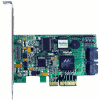
Once synonymous with servers, RAID has made its way into the mainstream thanks to the inclusion of onboard controllers by the motherboard manufacturers. Can a dedicated card make much of a difference to system performance? Along with High Point, we intend to find out.
Page 2 – Software, Testing, Final Thoughts
Included with the 2310 controller card is a disk. This disk allows the user to install a web based admin console as well as make a floppy disk. In the following pictures, the versatility of the card is shown by the many number of operating systems supported. If one wanted to scroll down the list of supported operation systems, FreeBSD is found at the bottom, along with Windows and multiple Linux distros.
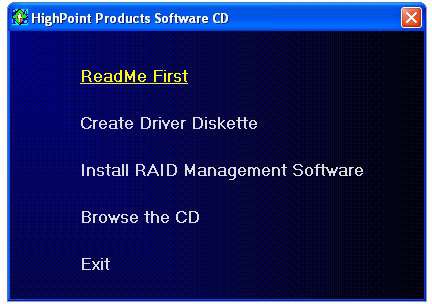
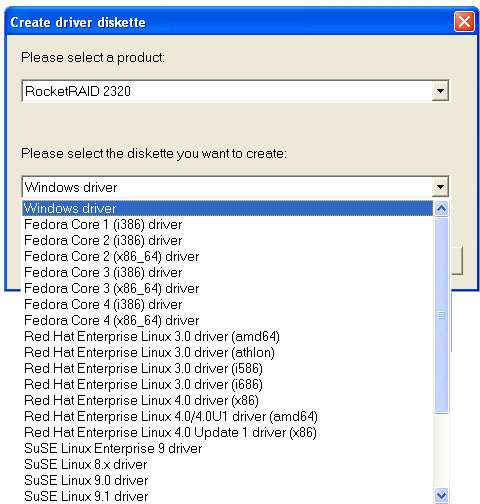
There are numerous tests that can be run to gauge just how the RocketRAID 2310 will perform. In our tests, we will run HD Tach, HD Tune, PC Mark ’05 as well as recorded load times of three popular games. Our test platform will consist of the following hardware:
- Intel Core 2 Duo E6600
- DFI ICFX3200-T2R/G
- Kingston Hyper-X 2GB PC2-6400
- Powercolor x1650 Pro
- Seagate Barracuda ES 750GB x4
It should also be noted that NCQ, while supported by the hard drives and both RAID controllers, will be turned off. Unless the hard drives are going to be accessed many time at once, NCQ creates a bit of system overhead and the resulting numbers reflect this time and time again.
As stated earlier in the review, the 2310 will be pitted against the onboard RAID controller on the DFI motherboard. This should show us where each excel when the same tests are ran on both controllers. To start out with, we will use the HDS benchmarking staples, HD Tach and HD Tune. While their testing procedures are very similar, they produce far different numbers. However, they do provide consistency from one controller to the next.
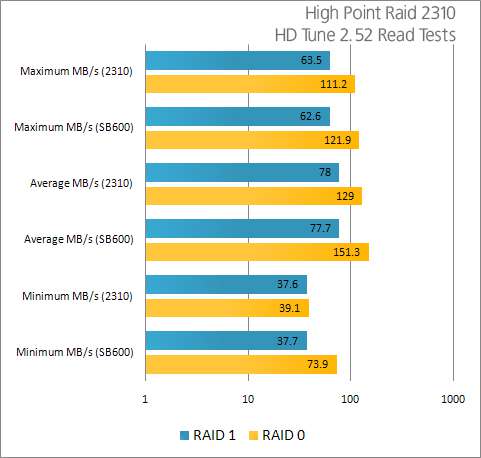
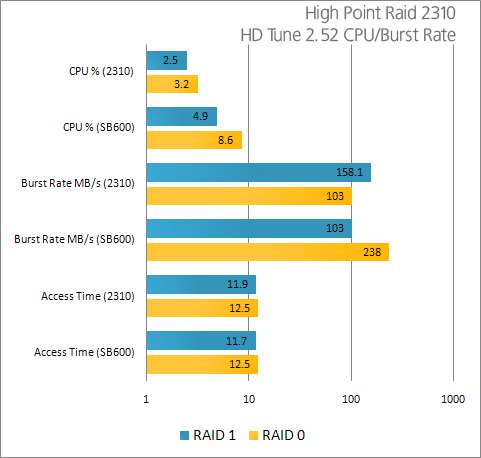
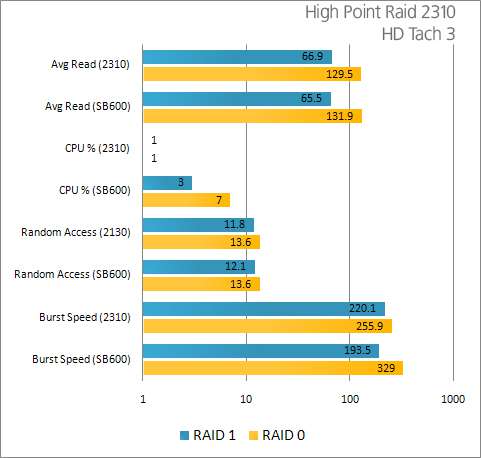
Next up is PC Mark ’05. In this bench, Futuremark’s bench suite tests a broad area of computer performance. For this review however, we will just be using their 5 HDD tests. This run consists of a XP startup test, an application loading test, general usage, a virus scan and a file write. All of these are something that we all will deal with on a daily basis.
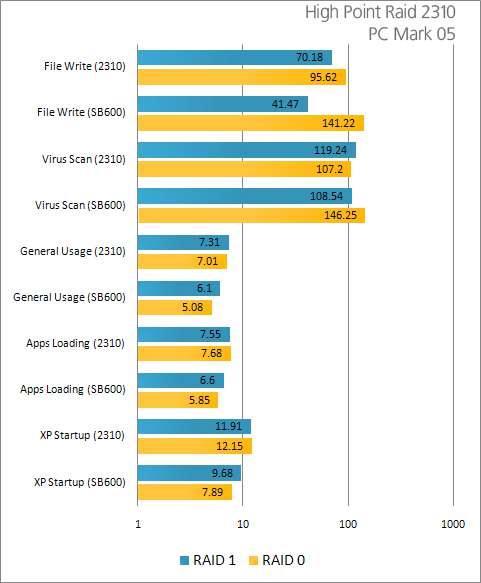
Finally, we will cover a few popular games and record how long it takes them to load the level. For the tests, we use Rise of Nations: Rise of Legends, Ghost Recon: Advanced Warfighter and Far Cry. This is where most gamers defend the use of RAID in their gaming PC. Most feel that if they can get an extra second in a game, it could mean the difference between victory and ownage. To test this, a pre-saved point in the games will be loaded.
From the time the load button is pressed, we will use a stopwatch to record the time it takes to load. We consider a game loaded when you are physically able to take control of your character. In Rise of Legends however, once the level is loaded, you are prompted to click to advance. To record this then, from the time the load button is pressed until the click to advance notice is shown, time is recorded. While this is a rather crude way to record time, and we are the first to admit this, we attempt to level the playing field by loading each game 3 times and then averaging the times. Once the game is loaded, the system is restarted to clear any game data that might be cached in memory. This way we get a consistent load each and every time.
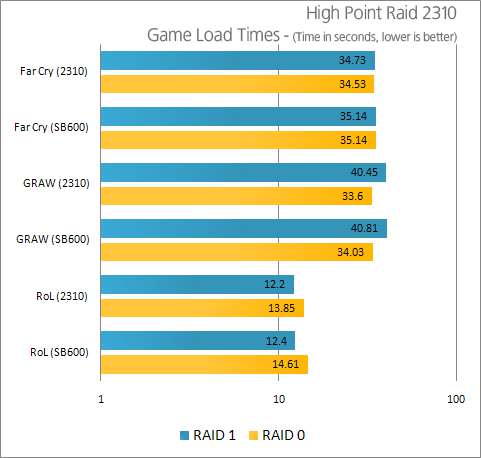
There you have it. When compared to an onboard solution, the majority of the tests found the High Point 2310 card besting the DFI Southbridge offering. The exceptions to this were found in the burst speed when in RAID 0. In most everything else, the 2310 comes out on top. Sometimes by a considerable margin, and sometimes not. The one thing to pay attention to the most, and this is coming from a gamers perspective, is the CPU usage.
Installation of the 2310 was simple and to the point. The only thing that I would have liked to have seen was a 3.5†floppy disk. As it ships, a driver disk must be made using the CD that ships with the card. In Vista, this isn’t an issue as drivers can easily be loaded during the OS install. However in XP, this creates a tricky situation should the user not have an extra PC that they can create a disk with. Aside from that, the card did was it said it would. Earlier I mentioned that we will be publishing an in-depth RAID article shortly that will cover the individual types of RAID and what benefits they offer to end users like you and me. In our article, this High Point RocketRAID 2310 controller card will be used and further information will posted about the performance.
Going into this article, I wanted to put my network experience to work and give a full blow review on the virtues of hardware RAID and a working environment. However, a different approach was used and the angle of the average gamers was the basis for this review. I feel that the purchase of a stand alone RAID card like this one is very similar to the reasoning behind purchasing a discreet sound card. Most want the added quality that a dedicated piece of hardware can provide.
Others want to take as much away from the CPU as possible and many want both. The same can be said about the RocketRAID 2310. Not only does it perform extremely well, but it also provides slightly faster loading times and does so by using very little of the CPU at all. With that rational, and given the $150.00 price tag, this is a very attractive choice for anyone looking to boost performance all around. With all this in mind, the High Point RocketRAID controller card gets a 9 out of 10 with an editor’s choice award on top.
- Pros
- Small
- Affordable
- Performs better than onboard solutions in most tests
- Takes load off of the CPU
- PCI-E
- 4 SATA II ports
- NCQ support for those that need it
- Informative Manual
- Cons
- No eSATA (see RocketRAID 2314 for this)
If you have a comment you wish to make on this review, feel free to head on into our forums! There is no need to register in order to reply to such threads.


|
|
Support our efforts! With ad revenue at an all-time low for written websites, we're relying more than ever on reader support to help us continue putting so much effort into this type of content. You can support us by becoming a Patron, or by using our Amazon shopping affiliate links listed through our articles. Thanks for your support!




